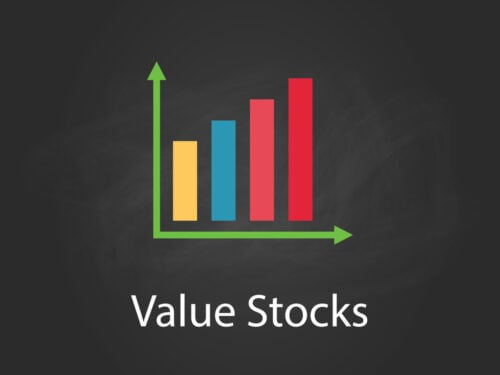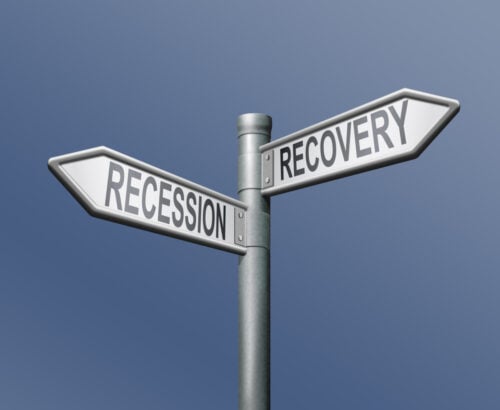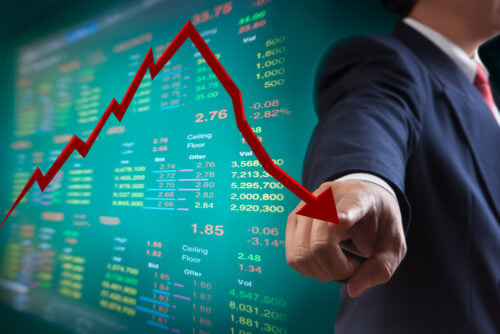There is a lot of talk about value stocks in the investing world. Some investors swear by them, while others think they are a waste of time. So with that said, do value stocks do better in a recession? Let’s take a closer look.
Are Value Stocks Good During a Recession?
Value stocks are those that trade at a lower price relative to their fundamentals, such as earnings or book value.
Considering the recessions in the past, when economic growth slows and stock prices decline across the board, value stocks tend to outperform growth stocks.
This is because value investors are more willing to pay a premium for companies with strong prospects during good times, but they become more value-conscious when the economy weakens.
As a result, value stocks typically offer a higher dividend yield and are less expensive on a price-to-earnings basis.

What Happens to Value Stocks During Recession?
Value stocks tend to outperform during periods of recession as investors seek out companies that are seen as being undervalued. This is because value stocks are typically more defensive in nature, with lower valuations and higher dividend yields.
While there is no guarantee that value stocks will always outperform during a recession, history has shown that they tend to do so. For example, during the last recession in 2008-2009, the S&P 500 Value Index outperformed the S&P 500 Growth Index by more than 10%.
This outperformance was even more pronounced in the 2001 recession when the S&P 500 Value Index rose while the S&P 500 Growth Index fell. Of course, it’s important to remember past performance is no guarantee of future results.
But, it is true that value stocks have shown a tendency to hold up better than growth stocks during periods of economic uncertainty. That said, they may be worth considering for investors looking to protect their portfolios from downside risk.
Should You Buy Stocks During a Recession?
For some investors, buying stocks during a recession can be a great opportunity to buy low and sell high. Others may prefer to wait until the economy is showing signs of recovery before investing in stocks.

Here are a few things to consider when deciding whether or not to invest in stocks during a recession:
- Your investment goals: If you’re aiming for long-term growth, buying stocks during a recession can be a good strategy, as long as you’re prepared to ride out any short-term market volatility.
- Your risk tolerance: If you’re comfortable with a higher level of risk, buying stocks during a recession can be a good way to boost your returns. However, if you’re risk-averse, you may want to wait until the economy is showing signs of improvement before investing in stocks.
- State of the economy: It’s important to keep an eye on economic indicators when deciding whether or not to invest in stocks. If the economy is in a downturn, that could mean more volatile markets and lower company profits, which could lead to stock prices falling further. On the other hand, if the economy is starting to recover, that could mean good news for stocks.
- Your time horizon: When investing for the long term, buying stocks during a recession can be a good way to get in at a lower price and ride out any short-term market volatility. However, if you’re investing for the short term, it’s important to be aware that stock prices could fall further during a recession.
What Type of Stocks Do Well in a Recession?
Historically, there are some types of stocks that tend to do better than others when the economy takes a turn for the worse.
Consumer staples, health care, and utilities are typically seen as defensive sectors, meaning they’re less vulnerable to economic downturns.
Under the consumer staples sector are companies that provide essential goods and services that people continue to need even when times are tough. Examples of consumer staple stocks include food, beverage, and personal care companies.

Now, health care stocks tend to do well in a recession because this sector includes companies that provide necessary medical goods and services. If people are cutting back on other expenses during a recession, they’re likely to continue to spend on health care.
And lastly, utilities stocks also tend to hold up relatively well during a recession. This is because people still need to pay for electricity, gas, and water even when the economy is struggling.
That’s not to say that these stocks will always outperform during a recession – nothing is guaranteed in the stock market – but they tend to be more resilient than other sectors. If you’re looking for stocks to hold during a recession, these are worth considering.
Do Tech Stocks Do Well in Recession?
It is generally agreed that tech stocks are more likely to weather a recession than other types of stocks.
Tech giants like Apple and Amazon, both of which have increased by about 30% in the last two months, are among the tech sector’s top performers. Other well-known brands like Tesla and Netflix have increased by 40% and 37%, respectively.

Some argue that the current valuations of tech stocks are unsustainable and that a recession will cause them to drop sharply.
However, many experts believe that the underlying fundamentals of the tech sector remain strong and that the sector will continue to outperform in a recession.
This is because the technology sector is typically less affected by economic downturns than other sectors, mainly for the following reasons:
- People continue to use and buy technology products even when the economy is struggling.
- Demand for tech products remains relatively high during a recession.
- Many technology companies have strong cash reserves that they can use to weather any downturn.
- The technology sector is often one of the first to recover from a recessionary period.
So, while there is no guarantee that tech stocks will do well in a recession, they certainly have a better chance than most.
Are Growth Stocks Good in a Recession?
As an investor, you’re always looking for opportunities to grow your portfolio. But in times of economic uncertainty, you may be wondering if growth stocks are still a good investment.
Growth stocks are typically defined as companies with high rates of earnings and sales growth. They are often associated with new and innovative businesses that have the potential to change their industry.
While growth stocks can offer impressive returns, they also can come with higher risks. Their share prices are usually more volatile than those of more established companies, and they can be more vulnerable to economic downturns.
The answer is not always clear-cut. While some investors believe that growth stocks are more likely to outperform in a recession, others believe that their high valuations make them more vulnerable to market declines.
Ultimately, it’s up to you to weigh the risks and rewards of investing in growth stocks during a recession. If you’re comfortable with the risks, then growth stocks could be a good way to grow your portfolio.
However, if you’re looking for stability during uncertain times, then you may want to consider other investment options.
What Should You Not Do in a Recession?
Recession can be a tough time for everyone, both financially and emotionally. It is important to watch your spending and make wise decisions during this time. Yet, there are still some things you can do, or avoid, to help weather the storm.

Here are five things you should avoid doing during a recession:
- Debt: It can be tempting to use credit cards or take out loans to make ends meet during a recession, but this is often a recipe for disaster. If you’re already struggling to keep up with your bills, adding more debt will only make things worse.
- Risky investments: Many people think they need to take more risks during a recession in order to make money, but this is often not the case. Stick to investments that are relatively safe and have a history of weathering economic downturns.
- Being a cosigner: If you don’t have the financial means to cover someone else’s debt, don’t cosign for it. This is especially true during a recession, when job losses and other financial setbacks are more common.
- Adjustable-rate mortgage: It can be a good option in some cases, but during a recession, it’s often best to stick with a fixed-rate mortgage. This way, you’ll know exactly how much your mortgage payment will be each month, making budgeting easier.
- Slacking off at work: It’s easy to feel like you can’t afford to make any mistakes at work during a recession, but slacking off can actually lead to unemployment. So do your best to stay focused and engaged at your job, even if times are tough.
Following these tips can help you avoid some of the most common mistakes people make during a recession. And while there’s no guarantee, taking these precautions can still help improve your chances.
What Sectors Do Poorly in a Recession?
In a recession, some sectors of the economy tend to do worse than others. So if you’re thinking about starting a business or planning to invest, it’s worth considering which sectors are likely to do well in a recessionary environment.

Here are three sectors that tend to perform poorly during economic downturns:
- Retail: Retail businesses may see a decline in sales during a recession as consumers cut back on spending. This can be especially challenging for small retailers who may not have the financial cushion to weather a slowdown.
- Travel and Tourism: Businesses that rely on travel and tourism may also suffer during a recession as people curtail their vacation plans. This can lead to a decline in bookings for hotels, resorts, and other businesses in the sector.
- Leisure and Hospitality: This sector includes businesses such as restaurants, bars, and entertainment venues. These businesses may see a decrease in customer traffic during a recession as people have less money to spend on discretionary items like dining out or going to the movies.
While these sectors may struggle during economic downturns, there are still opportunities for businesses to succeed.
For example, some retail businesses may focus on selling essential items that consumers need regardless of the economy. And businesses in the travel and tourism sector may work to attract budget-conscious consumers who are looking for deals.
Where Is the Safest Place to Put Your Money During a Recession?
There is no such thing as a recession-proof asset allocation. But if you’re looking for a safe place to put your money during a recession, you might want to consider some of the following options:
- High-yield savings accounts: These accounts typically offer higher interest rates than traditional savings accounts, which means your money can grow faster. And since they’re FDIC-insured, your money is safe up to $250,000 per account.
- Municipal bond funds: Municipal bonds are debt securities issued by state and local governments. They tend to be less risky than other types of bonds, making them a good choice for investors who are risk-averse.
- Federal bond funds: Federal bonds are debt securities issued by the US government. They’re considered one of the safest investments because the government has never defaulted on its debt.
- Money market funds: Money market funds are a type of mutual fund that invests in short-term debt securities, such as Treasury bills and commercial paper. They tend to be less volatile than other types of mutual funds, making them a good choice for investors who are risk-averse.
- Dividend funds: Dividend funds are a type of mutual fund that invests in stocks that pay dividends. They can offer potential income and growth during a recession, making them a good choice for investors who are looking for both safety and returns.
Final Thoughts: Do Value Stocks Do Better in a Recession?
Value stocks tend to outperform the market during downturns, while growth stocks usually fall behind. This is likely due to the fact that investors are looking for stability and dividends during tough times, which value stocks typically offer more of than growth stocks.
There are certain sectors that tend to do well during recessions: consumer staples, health care, and utilities.
All of these industries offer products or services that people still need even when money is tight. In other words, they are considered “safe” investments.
So if you’re looking for stock ideas to ride out a recession, look at companies from these three sectors. They should hold up relatively well even if the economy takes another turn for the worse.


 Tags:
Tags:










